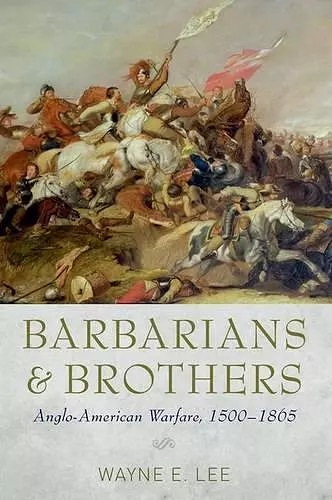Barbarians and Brothers
Anglo-American Warfare, 1500-1865
Format:Paperback
Publisher:Oxford University Press Inc
Published:15th May '14
Currently unavailable, and unfortunately no date known when it will be back
This paperback is available in another edition too:
- Hardback£51.00(9780199737918)

The most important conflicts in the founding of the English colonies and the American republic were fought against enemies either totally outside of their society or within it: barbarians or brothers. In this work, Wayne E. Lee presents a searching exploration of early modern English and American warfare, looking at the sixteenth-century wars in Ireland, the English Civil War, the colonial Anglo-Indian wars, the American Revolution, and the American Civil War. Crucial to the level of violence in each of these conflicts was the perception of the enemy as either a brother (a fellow countryman) or a barbarian. But Lee goes beyond issues of ethnicity and race to explore how culture, strategy, and logistics also determined the nature of the fighting. Each conflict contributed to the development of American attitudes toward war. The brutal nature of English warfare in Ireland helped shape the military methods the English employed in North America, just as the legacy of the English Civil War cautioned American colonists about the need to restrain soldiers' behavior. Nonetheless, Anglo-Americans waged war against Indians with terrifying violence, in part because Native Americans' system of restraints on warfare diverged from European traditions. The Americans then struggled during the Revolution to reconcile these two different trends of restraint and violence when fighting various enemies. Through compelling campaign narratives, Lee explores the lives and fears of soldiers, as well as the strategies of their commanders, while showing how their collective choices determined the nature of wartime violence. In the end, the repeated experience of wars with barbarians or brothers created an American culture of war that demanded absolute solutions: enemies were either to be incorporated or rejected. And that determination played a major role in defining the violence used against them.
In Barbarians and Brothers, Wayne Lee has taken on a daunting challenge -- nothing less than a history of over three and a hald centuries of Anglo-American warfare. He succeeds admirably, and the resulting work makes significant contributions, especially in the fields of early American and military history... Lee's work is informed by the larger overall trend toward anthropological, ethnographical approaches to violence. The conclusions rest on sound research conducted in archives on both sides of the Atlantic, and the extensive notes demonstrate Lee's familiarity with wide-ranging literature on violence and warfare in divergent cultural contexts... The book excels are connecting military affairs to larger societal concerns at almost every point... Lee has produced a fine work that should receive wide scholarship. * The North Carolina Historical Review *
Wayne Lee satisfies a long-overdue need in military history, by imposing an Atlanticist rationale to the conduct of warfare in the English Old and New Worlds. Renaissance and early modernists will rightly marvel at his fluency in the primary record. * Renaissance Quarterly *
Readers with a wide range of interests--including the cultural aspects of warfare and the debates about the value of the concepts 'limited' and 'total' war, the military revolution, and the 'American way of war'--will find Barbarians and Brothers rewarding reading. * Journal of Interdisciplinary History *
Engaging and rewarding . Lee's framework for the study of war and culture, and his original exploration of the idea of restraint, will inform and enrich all future discussions. * Journal of British Studies *
An insightful book...Wayne E. Lee has produced a sound study bolstered by solid statistical and colorful anecdotal evidence, a skillful blend of old-fashioned narrative with nuanced analysis. * Journal of American History *
ISBN: 9780199376452
Dimensions: 231mm x 155mm x 25mm
Weight: 499g
356 pages